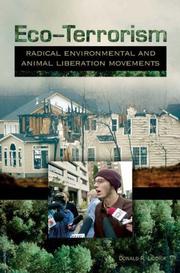| Listing 1 - 10 of 52 | << page >> |
Sort by
|
Book
ISBN: 2348068133 2348068125 Year: 2023 Publisher: Paris : La Découverte,
Abstract | Keywords | Export | Availability | Bookmark
 Loading...
Loading...Choose an application
- Reference Manager
- EndNote
- RefWorks (Direct export to RefWorks)
"Depuis quelques années, les mobilisations pro-animaux suscitent une attention publique particulière : aux associations établies oeuvrant à la 'protection' des animaux s'ajoutent désormais des collectifs revendiquant plutôt leur 'libération'. Leur point commun: défendre les intérêts des animaux. Le lectorat francophone ne disposait pas encore de synthèse distanciée, faisant le point sur les propriétés sociales, politiques et morales de ces mouvements. Ce livre entend combler ce manque en présentant l'état des connaissances sur l'histoire et la structuration de la cause animale aujourd'hui. Cette mise en perspective remonte jusqu'au XIXe siècle. Les mobilisations contemporaines sont cartographiées. Les raisons de l'engagement pour les animaux et la variété de ses formes sont analysées, de même que les liens des mouvements avec d'autres mondes sociaux (les politiques publiques, les marchés, le monde académique). Cet ouvrage fournit ainsi des clés de compréhension sociologique sur la façon dont la défense des animaux transforme nos sociétés"--Page 4 of cover.

ISBN: 0029161959 Year: 1992 Publisher: New York (N.Y.): Free Press
Abstract | Keywords | Export | Availability | Bookmark
 Loading...
Loading...Choose an application
- Reference Manager
- EndNote
- RefWorks (Direct export to RefWorks)
Book
ISBN: 0312104731 9780312104733 Year: 1994 Publisher: New York : St. Martin's Press
Abstract | Keywords | Export | Availability | Bookmark
 Loading...
Loading...Choose an application
- Reference Manager
- EndNote
- RefWorks (Direct export to RefWorks)
Who are the Great Apes? They are chimpanzees, gorillas, orang-utans, and, according to co-editors Paola Cavalieri and Peter Singer, and a distinguished group of international contributors, they are persons. Yes, persons, capable of reflections, emotions, joy, as well as, all too often, pain. On the other hand, as one of this book's contributors, Richard Dawkins, has written, while we admit that we are like apes, "we seldom realize that we are apes.". Beginning with the "Declaration on Great Apes," a scientific and moral call to arms modeled after the United Nations Declaration of Human Rights, The Great Ape Project, both as a book and as a political manifesto, unequivocally states its primary goals: to ensure "The Right to Life," "The Protection of Individual Liberty," and "The Prohibition of Torture" to every nonhuman great ape. In fact, The Great Ape Project looks forward to a new stage in the development of the community of equals, whereby chimpanzees, gorillas, and orang-utans will actually receive many of the same protections and rights that are already accorded, although so often abrogated, to man. Thirty-four authors from nine different countries each write from the perspective of his or her own experience about the great apes. Richard Dawkins, author of The Selfish Gene, and Jared Diamond, author of The Third Chimpanzee, explain how closely related we are to the other apes, while anthropologists and a biologist question the divide we place between ourselves and the other great apes. Taken together, the contributions make a uniquely satisfying whole, blending observation and interpretation in a highly persuasive case for a complete reassessment of the moral status of our closest kin. The Great Ape Project is a book whose impassioned convictions will summon up the spectre of the Scopes Monkey Trial and will, once again, alter our own self-image as human beings. The authors include celebrated observers of free-living apes: Jane Goodall, Adriaan Kortlandt, and Toshisada Nishida (and a more unusual observer of our galaxy, Douglas Adams). Other scientists describe extraordinary conversations with chimpanzees, gorillas, and orang-utans, which have been carried out in sign language over dozens of years. With such assertions throughout, it is no wonder that The Great Ape Project has been embroiled in controversy even before its American publication.
Book
ISBN: 0472126253 Year: 2019 Publisher: Ann Arbor, Michigan : University of Michigan Press,
Abstract | Keywords | Export | Availability | Bookmark
 Loading...
Loading...Choose an application
- Reference Manager
- EndNote
- RefWorks (Direct export to RefWorks)
Given their tendency to splinter over tactics and goals, social movements are rarely unified. While most scholars agree factionalism can be a major hurdle for successful mobilization, existing research is limited. Following the modern Western animal rights movement over thirty years, Piecemeal Protest applies the sociological theory of Bourdieu, Goffman, Weber, and contemporary social movement researchers to examine structural conditions facilitating factionalism in today's era of professionalized advocacy. Modern social movements are dominated by bureaucratically-oriented nonprofits, a special arrangement which creates significant tension between activists and movement elites who compete for success in a corporate political arena. Piecemeal Protest examines the impact of nonprofitization on factionalism and a movement's ability to mobilize, resonate, and succeed. Corey Lee Wrenn's exhaustive content analysis of archival movement literature and exclusive interviews with movement leaders illustrate how entities with greater symbolic capital are positioned to monopolize claimsmaking, disempower competitors, and replicate hegemonic power, eroding democratic access to dialogue and decision-making essential for movement health. Piecemeal Protest examines social movement behavior shaped by capitalist ideologies and state interests. Heavy factional boundary maintenance may prevent critical discourse within the movement, and may provoke the symbolic appropriation of radical claimsmaking for bureaucratic ends and radical suppression. As power concentrates to the disadvantage of marginalized factions in the modern social movement arena, Piecemeal Protest shines light on processes of factionalism and considers how, in the age of nonprofits, intra-movement inequality could stifle social progress.
Book
ISBN: 9791021039261 Year: 2021 Publisher: Paris: Tallandier,
Abstract | Keywords | Export | Availability | Bookmark
 Loading...
Loading...Choose an application
- Reference Manager
- EndNote
- RefWorks (Direct export to RefWorks)
Book
ISBN: 3837618242 9783837618242 9783732818242 3732818241 Year: 2013 Publisher: Bielefeld
Abstract | Keywords | Export | Availability | Bookmark
 Loading...
Loading...Choose an application
- Reference Manager
- EndNote
- RefWorks (Direct export to RefWorks)
Book
ISBN: 9401211744 Year: 2014 Publisher: Amsterdam, [Netherlands] ; New York : Rodopi,
Abstract | Keywords | Export | Availability | Bookmark
 Loading...
Loading...Choose an application
- Reference Manager
- EndNote
- RefWorks (Direct export to RefWorks)
Finalist of the 2016 National Indie Excellence Book Awards in the Social/Political Change Category! This award honors outstanding books from smaller or independent publishers that deserve recognition 'for going the extra mile to produce books of excellence in every aspect.' The book was originally published by Rodopi and acquired by Brill in January 2014. To what extent should animal rights activists promote animal rights when attempting to persuade meat-lovers to stop eating animals? Contributing to a classic social movement framing debate, Freeman examines the animal rights movement’s struggles over whether to construct farming campaign messages based more on utility (emphasizing animal welfare, reform and reduction, and human self-interest) or ideology (emphasizing animal rights and abolition). Freeman prioritizes the latter, “ideological authenticity,” to promote a needed transformation in worldviews and human animal identity, not just behaviors. This would mean framing “go veg” messages not only around compassion, but also around principles of ecology, liberty, and justice, convincing people “it’s not fair to farm anyone”. Through a unique frame analysis of vegan campaign materials (from websites, to videos, to bumper stickers) at five prominent U.S. animal rights organizations, and interviews with their leaders, including Ingrid Newkirk and Gene Baur, Freeman answers questions, such as: How is the movement defining core problems and solutions regarding animal farming and fishing? To which values are activists appealing? Why have movement leaders made these visual and rhetorical strategic choices – such as deciding between appealing to human self-interest, environmentalism, or altruism? To what extent is the animal rights movement actually challenging speciesist discrimination and the human/animal dualism? Appealing to both scholars and activists, Framing Farming distinctively offers practical strategic guidance while remaining grounded in animal ethics and communication theory. It not only describes what 21st century animal rights campaigns are communicating, it also prescribes recommendations for what they should communicate to remain culturally resonant while promoting needed long-term social transformation away from using animals as resources.

ISBN: 0275985350 9780275985356 Year: 2006 Publisher: Westport (Conn.) : Praeger,
Abstract | Keywords | Export | Availability | Bookmark
 Loading...
Loading...Choose an application
- Reference Manager
- EndNote
- RefWorks (Direct export to RefWorks)
Animal rights movement --- Animal rights movement --- Ecoterrorism --- Environmentalism --- Moral and ethical aspects --- History. --- History. --- History.
Book
ISBN: 1847923844 9781847923844 Year: 2015 Publisher: London : The Bodley Head,
Abstract | Keywords | Export | Availability | Bookmark
 Loading...
Loading...Choose an application
- Reference Manager
- EndNote
- RefWorks (Direct export to RefWorks)
In this influential book, Peter Singer discusses the evolution of the animal rights movement. He also graphically updates his account of what is being done to animals in the laboratory or on the farm.
Animal experimentation. --- Animal rights movement --- Animal rights movement. --- Animal rights. --- History.
Book
ISBN: 1299140912 1476601321 9781476601328 9780786465750 0786465751 Year: 2013 Publisher: Jefferson, North Carolina McFarland & Company, Inc., Publishers
Abstract | Keywords | Export | Availability | Bookmark
 Loading...
Loading...Choose an application
- Reference Manager
- EndNote
- RefWorks (Direct export to RefWorks)
"This volume broadens animal liberation dialogues by offering the arguments, challenges, inspiration and narratives of grassroots activists. The essays show what animal advocacy looks like from a collective of individuals living in and around Minnesota's Twin Cities; the essayists, however, write of issues, both personal and political, that resound on a global scale"--Provided by publisher.
Animal rights movement. --- Animal rights. --- Veganism. --- Animal rights movement --- Animal rights --- Veganism
| Listing 1 - 10 of 52 | << page >> |
Sort by
|

 Search
Search Feedback
Feedback About UniCat
About UniCat  Help
Help News
News